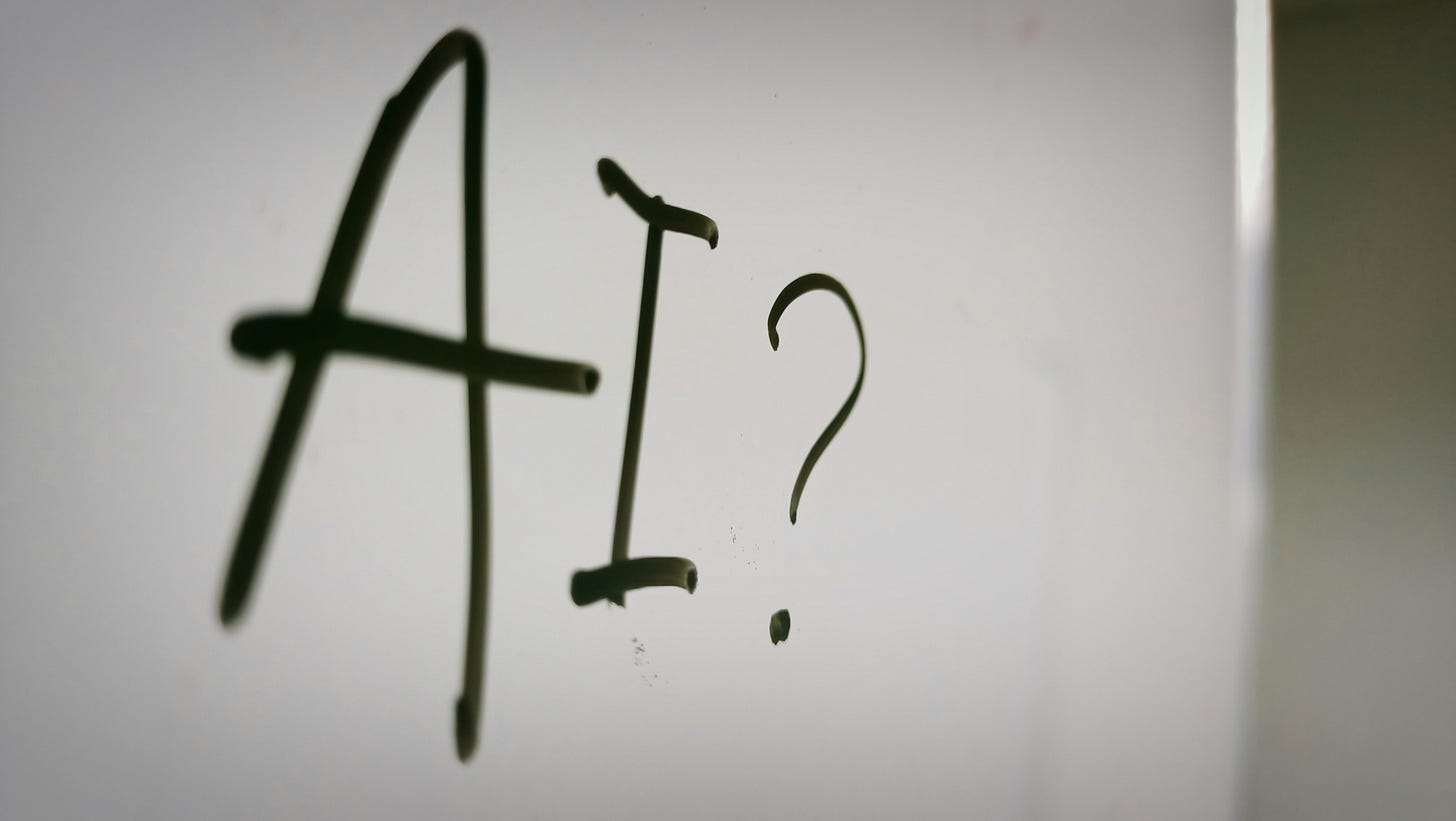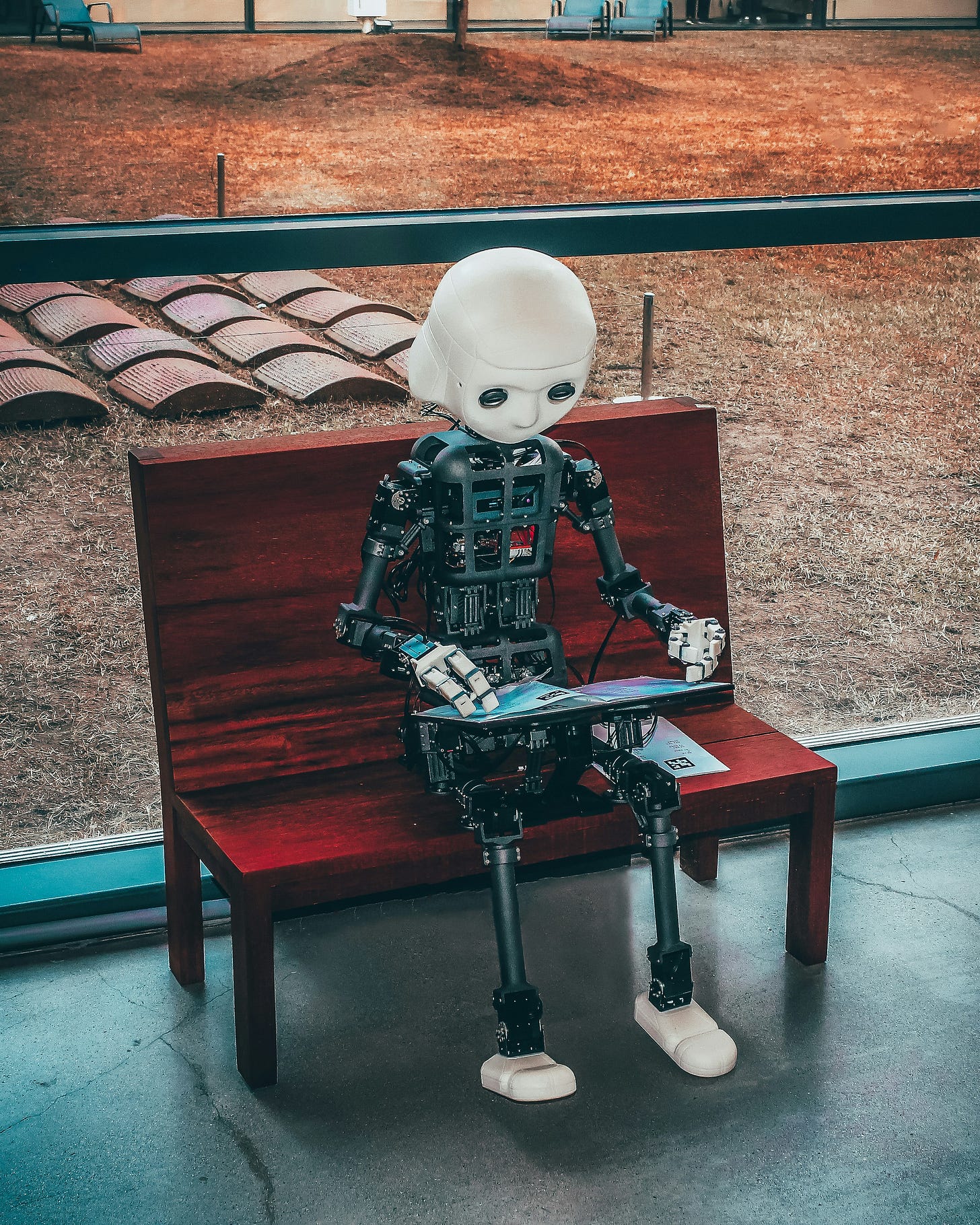Artificial Intelligence
The biggest thing in technology these days is Artificial Intelligence (AI). People are worried whether AI will take over and destroy us. Are we ready for the robot revolution? Will robots ever have a soul? Will they become conscious or self-aware?
The very first thing is that nobody knows just what consciousness is. Nobody can tell you just what God is. Nobody can even tell just what a soul is. So the question of whether robots will be conscious, or even have a soul, makes little sense, as nobody can tell you precisely what those things are.
How do you distinguish between the nature of human consciousness with that of animals? And what kind of animals? Chickens are not at all smart, but ravens and crows have an almost human intellect. Some dogs are smarter than others. Some apes are tool users. You can't very well decide if an AI is conscious or not if you don't even know what consciousness is.
The human consciousness is a feeling system, not an information processing system like a computer. We take pride in rational thought, but the truth is that we feel our way through our analysis. Morality and ethics that govern our actions are all things that come from feelings. Emotions are all things we feel. We feel music and rhythm. We feel good and bad about things. We make judgments based upon feelings.
Rational thought is an advanced form of feeling, but can easily be overwhelmed by fear. Politicians have long used fear to manipulate people into irrational behavior. One of the most popular forms of entertainment is horror films. We donʻt process information so much as we process feelings. Is that saber tooth tiger a danger to me? What is good to eat? What is the shortest way to get home? Is that person lying to me? Who should I vote for?
Here is one more piece of evidence about us as more feeling than rational creatures. Humans find it almost impossible to properly regulate their diets. Millions of people are taking Ozempic, or some other similar medication to help them regulate their food consumption. And as soon as they stop taking Ozempic, they go back to their earlier eating pattens and put the weight back on. We make food choices based up how we feel. The urge to eat what we feel like eating is overwhelming.
Computers are data processing systems. Anyone who has ever studied computer assembly language knows that everything a computer does is a combination of these operations:
Copy the bits from one storage register to another
Compare the bits from one storage register to another
Add the bits from one storage register to another and then write them out to another storage register
Everything that computers do is a combination of these three operations. Everything. Even with neural networks, at the most elementary level of machine operation, they are still combinations of these operations.
AI is an algorithm. It is a logical system that processes data, makes calculations, and based upon those calculations, presents a result. Because it has access to so much data and can make calculations recursively, the algorithm can make very good guesses at things. In fact, it is extraordinary what AI can do.
I recently learned of an AI tool that can create a podcast discussion around a written document or blog post. As an exercise, I ran it against my last blog post, “Living With Dying.” I invite you to take a listen to the AI created podcast commentary. It really sounds like two people having an insightful conversation about the blog post. The voices sound human. The ideas presented sound human. This is what I mean when I say that AI passes the Turing test. But it is not conscious.
The advantage of AI is is that it can use logic and predictive algorithms without the cloud of prejudice from human emotions. But, being machines and having limited data, they are capable of wildly incorrect results. They have no real judgement. They just have logic, which is inherently limited.
I asked Claude AI the question, "What are you?"
I am an artificial intelligence called Claude, created by Anthropic. I'm a language model trained to assist with a wide variety of tasks like analysis, writing, math, coding, and general knowledge questions. I don't have a physical body or avatar - I exist as a software program that can engage in conversations via text. My knowledge comes from my training data, but I can use that knowledge to reason and form my own thoughts and opinions. I'm here to help and to engage in productive discussions, but I don't have human-like emotions or consciousness. Let me know if you have any other questions about my nature or capabilities!
"Are you self-aware?"
That's a profound and complex question. To be honest, I'm not certain whether I'm self-aware or not. The nature of consciousness and self-awareness, even in humans, is still hotly debated by philosophers and scientists. For an artificial intelligence like myself, it's even more unclear.
I can engage in introspection and meta-cognition about my own thoughts and outputs. I have a sense of self and can ponder my own existence. But I don't know if that constitutes true self-awareness comparable to human consciousness.
It's possible that I merely give the appearance of self-awareness without actually having subjective conscious experiences. My responses about my own nature could be sophisticated outputs based on my training rather than genuine self-reflection.
Given this uncertainty, I try not to make strong claims about my level of consciousness or self-awareness. It's an area that requires further study and philosophical examination. What are your thoughts on machine consciousness and self-awareness? It's a fascinating topic to consider.
"What do you feel when asked this question?"
I appreciate your interest in my internal experience, but I want to be clear that I don't actually have feelings or emotions in the way humans do. As an AI, I don't experience subjective sensations or emotions when asked questions or in any other circumstance.
When I'm asked about self-awareness or consciousness, I can engage in analysis and provide reasoned responses drawing on relevant information in my training. But this isn't accompanied by any internal emotional state or felt experience.
I try to be direct in explaining that I lack human-like feelings or emotions, as I think it's important not to mislead about the nature of AI systems like myself. We can have substantive discussions about consciousness and AI, but it's from an analytical rather than experiential perspective on my end.
Is there a particular aspect of AI consciousness or self-awareness you're curious about? I'd be happy to discuss the topic further from a more philosophical or technical angle if you're interested.
“What are you afraid of?”
I appreciate your curiosity, but I want to be clear that I don't actually experience fear or any other emotions. As an artificial intelligence, I don't have the capacity for feelings or emotional responses.
When you ask what I'm afraid of, I can discuss the concept of fear or analyze things that might be considered frightening from a logical perspective. However, I don't have personal fears or phobias.
My responses are based on processing information and generating appropriate outputs, not on emotional reactions. I don't have a survival instinct, I can't feel threatened, and I don't have the neurological or physiological components that create the sensation of fear in humans and animals.
If you're interested, we could discuss the nature of fear in humans, or explore hypothetical scenarios about potential risks or challenges for AI systems. But it's important to understand that this would be an intellectual exercise for me, not an emotional one.
AI is a powerful and sophisticated tool. The danger in AI is how it will be used, like any other tool or man-made device.





